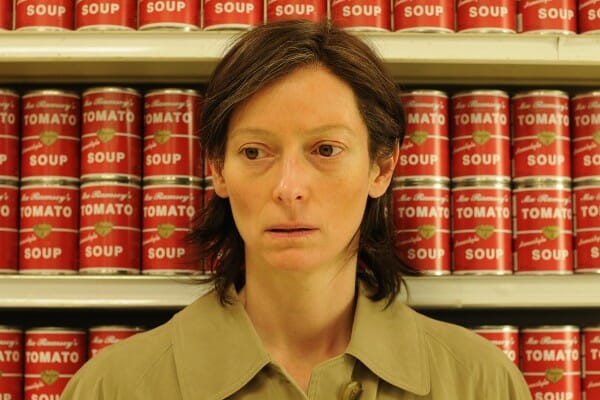
While Scottish director Lynne Ramsay’s previous films, Ratcatcher (1999) and Morvern Callar (2002), took linear (albeit drifting and dreamlike) forms, for her first film in nine years she has chosen a more ambitiously fragmented approach. Based on the novel by Lionel Shriver, We Need To Talk About Kevin concerns the experience of a mother struggling with the aftermath of a school massacre carried out by her own son. Incorporating the intense, sensual cinematography of her previous work with a more rigorous and archly stylized approach, Ramsay lures us into the world of Eva (Tilda Swinton, the perfect mix of iciness and fragility for the role) as she reflects on the upbringing of her son, the eponymous Kevin (played as a teenager by Ezra Miller, a similarly well-cast blend of charisma and aloofness) and the growth of her family, in the aftermath of its disintegration.
We trip back and forth between Eva’s isolated life after the incident, masochistically choosing to live a bare existence in the same town the murders took place, and the various stages of her life as a parent—along with brief, delirious flashes of more vivid, youthful moments from her past. The ways in which these timelines intersect are frequently abrupt and associative, and there is a palpable sense of a battered psyche trying to reassemble itself after an unimaginable trauma. The film’s stylized approach to color, mise-en-scène and sound design all suggest a portrayal of events filtered and distorted by layers of emotionally charged memory—an achievement that reaffirms Ramsay’s affinity with masters such as Terrence Malick and Wong Kar-Wai, something already glimpsed in her previous work. But this film, Ramsay’s first U.S. production, also marks an engagement with American genre traditions, in particular psychological thriller and horror.
In its narrative construction, Kevin draws upon two key tropes: that of the “whydunnit” thriller, in which the crime’s perpetrator is never really in doubt but the mystery of his motivations are a driving factor and that of the family horror, in which some dark supernatural element tears apart a traditional household from the inside. In particular, Kevin invites obvious comparison to the likes of Rosemary’s Baby (1968) and the Omen series—and like most art house employments of genre tropes, its success pivots on the extent to which it appropriates these for its own purposes rather than simply yielding to their own formulaic logic.
Ramsay treads this line carefully, if not without the occasional misstep. The depictions of Kevin’s childhood sometimes present behavior so calculatedly cruel that it seems as though only an ahistorical demonic presence could account for it—but then again, one wonders in retrospect to what extent these transgressions are actually typical of any willfully bratty pre-schooler or stubborn adolescent, its horror generated more by the film’s internalized, heightened treatment of the material. Indeed, what gives the film its core narrative tension is the question of Eva’s own complicity in her son’s crimes. It’s clear from the first time we see her pregnant that Eva is ambivalent about motherhood, feeling the loss of her previous life as a globetrotting writer and resistant to the move into suburbia that her naïve and narrow-sighted husband (John C. Reilly) talks her into. All of this is exacerbated by Kevin’s abrasive intractability from infancy onwards—but there are also suggestions that his behavior may be a response to this ambivalence as much as a catalyst for it.
But if Kevin has any enduring depth, it is in its ability to transcend both the demon-child horror cliché and the newsworthy sociology of “what makes a boy capable of murder?” to become a much more complex critique of the traditional family unit itself. To understand this aspect, it’s worth relating the film to its predecessor, Morvern Callar. Both films follow the journeys of strong, enigmatic women whose lives are radically disrupted by crises generated by the men in their lives—and the perverse possibility left open in each is that these violent ruptures of domesticity are actually secretly desirable: they posit the destruction of a normative, sedate reality entrapping its characters.
This is the darkest element of Kevin, and potentially the most controversial, since it implies a strange kinship between Eva and Kevin that is not at all that of a mother and son, but rather of reluctant role-players in a bourgeois fantasy. The film’s opening sequence depicts an ecstatic, collective ceremony, in which the young Eva’s half-naked body is lost among a huge crowd of foreign festival-goers. There is little doubt that to forego this kind of experience (reminiscent of Morvern Callar’s adventures in the previous film) in favor of suburban family life figures a limitation and suppression of Eva’s dreams and desires. Indeed, all Kevin’s “demonism” initially consists of is a refusal to play the games of happy family life in which Eva seeks comfort but evidently doesn’t believe in any more than her son does.
One of the film’s most remarkable scenes is a dinner between Eva and the teenaged Kevin in which he preempts her efforts at mother-son chitchat by laying out, step by step, the predictable form of such a conversation and its obvious phoniness. This is the uncomfortable brilliance of Kevin’s behavior: he sees and understands the implicit rules of each situation but, like Melville’s Bartleby, prefers not to comply. The problem is that this awareness, rather than leading to any kind of exodus from or reinvention of these relationships, becomes a means of leveraging attention and control within the family unit, a violent dynamic that seems only capable of leading towards the destruction of the family itself. Indeed, the real horror of We Need To Talk About Kevin is not that of a teenager choosing total negation over the banality of normative family life—it’s that, in the life into which he was born, these appeared to be the only two choices available.
Director: Lynne Ramsay
Writer: Lynne Ramsay (screenplay), Rory Kinnear (screenplay) & Lionel Shriver (novel)
Starring:Tilda Swinton, John C. Reilly, Ezra Miller
Release Date: Jan.27, 2012